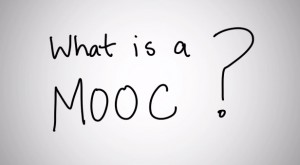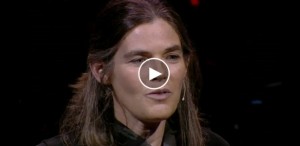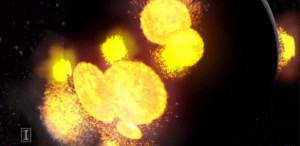Jason Mock, Center for Innovation in Teaching and Learning, Jim Witte, Applied Technology for Learning in the Arts and Sciences
Fall 2014
MOOC’s are Massive Open Online Courses. They are typically free to the learner, which yields massive numbers of registrants from all over the world. The concept was first pioneered in 2008 by George Seimens (Athabasca University) and Stephen Downes (National Research Council) with a MOOC on Connectivism and Connective Knowledge (CCK08). Since then, the MOOC phenomenon has expanded to include organizations that provide a technological infrastructure and other support services necessary to offer courses at large scale. Some of the leading organizations include Coursera (with which Illinois partners), edX, Udacity, and FutureLearn. Other platform providers include Blackboard CourseSites, Canvas, and Udemy, to name a few.
 Dave Cormier, who coined the term “MOOC,” explains what a MOOC is.
Dave Cormier, who coined the term “MOOC,” explains what a MOOC is.
Daphne Koller, co-founder of Coursera, shares her vision of how MOOCs can address a global need in this TED talk.
Why Did Illinois Get Involved With MOOCs?
The University of Illinois at Urbana-Champaign has a long history with distance learning that formed the foundation upon which our involvement with MOOCs was built. Almost 45 years after Illinois developed PLATO, the world’s first computer-assisted instructional system, Illinois’ expertise has evolved and infrastructure grown to support hundreds of for-credit, fully-online courses. Thus, engaging with MOOCs was a logical extension of the ground-breaking work in online education already underway by this campus.
By offering MOOCs, Illinois carries out our land-grant mission of serving the citizens of our state, country, and world. We also recognized early-on that MOOCs were going to be a significant educational phenomenon. We were positioned to be a leader in that space by virtue of our experience in online education and doing so required our participation. Indeed, Illinois is now seen as a leader in MOOCs, and our courses are amongst the first that Coursera recommends new partner institutions explore. MOOCs also serve as a way of highlighting Illinois’ strengths, history, and our amazing faculty and programs. Furthermore, the MOOC platform provides us with fertile grounds for innovating online pedagogical strategies and exploring research in online education.
What is Illinois’ Involvement With MOOCs?
Illinois contracted with Coursera in July 2012 to begin offering courses on that platform. Having launched Coursera just a few months prior in fall 2011, Chancellor Wise welcomed Illinois as the first land-grant institution in the Coursera partnership. Illinois’ first MOOC, Introduction to Sustainability offered by Professor Jonathan Tomkin in the College of LAS, was offered only a few weeks later in August. Most of Illinois’ initial MOOCs originated out of the Colleges of LAS and Engineering, with support from Applied Technologies for Learning in the Arts and Sciences (ATLAS) and the Center for Innovation in Teaching and Learning (CITL). These included LAS Professor Jose Vazquez’s Microeconomics Principles and Engineering Professor Lawrence Angrave’s Creative, Serious, and Playful Science of Android Apps courses, each serving over 160,000 registrants across their respective sections.
Angrave on MOOCs
Since then, Illinois has offered 8 courses through a total of 28 offerings (as of August 2014). Illinois’ ability to produce MOOCs so quickly comes from our extensive experience in quality online education, our ability to leverage existing infrastructure and staff, and our approach of repurposing MOOC content in our campus online and hybrid courses.
Lawerence Angrave on the Evolution of MOOC’s
More recent and upcoming MOOC offerings include LAS Professor Bruce Fouke’s Emergence of Life (highlighting the late Carl Woese‘s discovery of the third branch in the tree of life), the ADM Institute on Post-Harvest Crop Loss Prevention‘s MOOC by the same name, and the College of Veterinary Medicine’s Sustainable Food Production Through Livestock Health Management with Professors Brian Aldridge and Jim Lowe, amongst many others.
The Emergence of Life MOOC promotional video.
What Are We Learning?
Offering MOOCs gives us unprecedented access to large amounts of educational research data. These data have enabled us to initiate various educational research projects to investigate many facets of online education. Thus far, we have already learned much about optimal course length, learner participation patterns, and more. Additionally, our experience in delivering MOOCs and feedback from learners have taught us much about serving globally diverse audiences, enhancing online pedagogy, optimizing video lecture delivery, managing large enrollments, and more. These insights have already been applied back into on-campus online and blended courses, improving the instruction we deliver to Illinois students.
What’s Next?
Strategically, Illinois will continue to be involved in MOOCs and to find new ways to leverage the content developed for MOOCs as well as the pedagogical lessons drawn from MOOC teaching strategies. We will continue to expand our educational research in this area and generate findings that can be applied to both the traditional online classroom as well as in future MOOCs.
How Can I Learn More?
Additional details about MOOCs at Illinois can be found on our campus MOOC website. Available online is also a listing of all Illinois MOOCs offered through Coursera.

